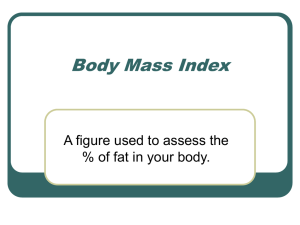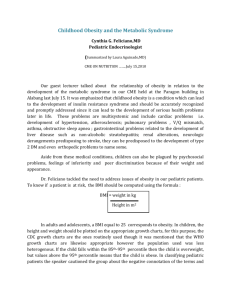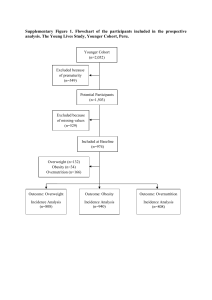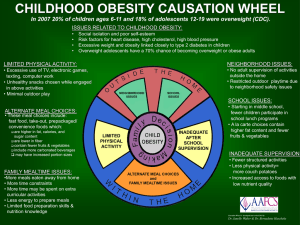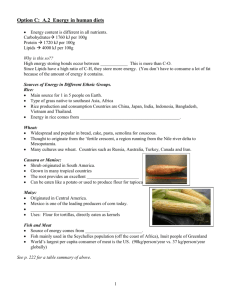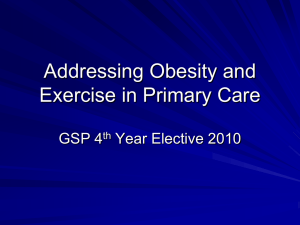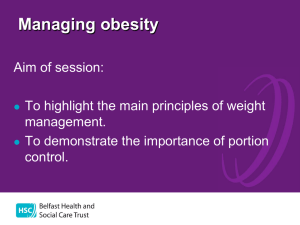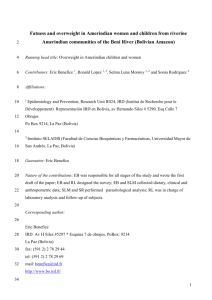Proposal File - Teaching Large Classes
advertisement
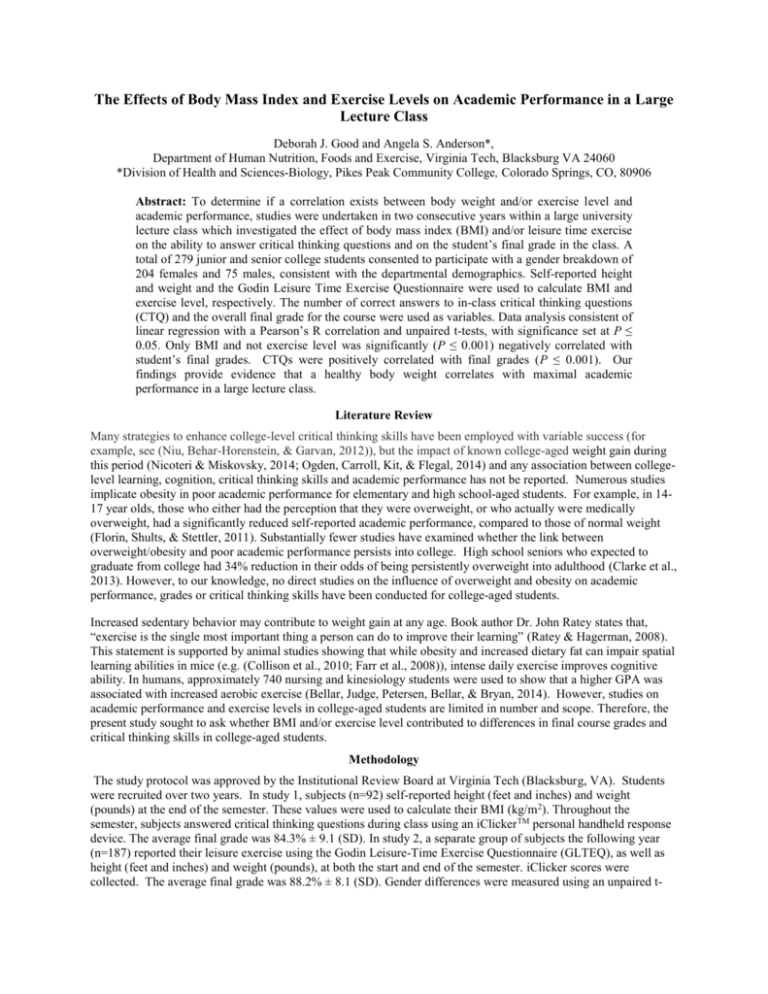
The Effects of Body Mass Index and Exercise Levels on Academic Performance in a Large Lecture Class Deborah J. Good and Angela S. Anderson*, Department of Human Nutrition, Foods and Exercise, Virginia Tech, Blacksburg VA 24060 *Division of Health and Sciences-Biology, Pikes Peak Community College, Colorado Springs, CO, 80906 Abstract: To determine if a correlation exists between body weight and/or exercise level and academic performance, studies were undertaken in two consecutive years within a large university lecture class which investigated the effect of body mass index (BMI) and/or leisure time exercise on the ability to answer critical thinking questions and on the student’s final grade in the class. A total of 279 junior and senior college students consented to participate with a gender breakdown of 204 females and 75 males, consistent with the departmental demographics. Self-reported height and weight and the Godin Leisure Time Exercise Questionnaire were used to calculate BMI and exercise level, respectively. The number of correct answers to in-class critical thinking questions (CTQ) and the overall final grade for the course were used as variables. Data analysis consistent of linear regression with a Pearson’s R correlation and unpaired t-tests, with significance set at P ≤ 0.05. Only BMI and not exercise level was significantly (P ≤ 0.001) negatively correlated with student’s final grades. CTQs were positively correlated with final grades (P ≤ 0.001). Our findings provide evidence that a healthy body weight correlates with maximal academic performance in a large lecture class. Literature Review Many strategies to enhance college-level critical thinking skills have been employed with variable success (for example, see (Niu, Behar-Horenstein, & Garvan, 2012)), but the impact of known college-aged weight gain during this period (Nicoteri & Miskovsky, 2014; Ogden, Carroll, Kit, & Flegal, 2014) and any association between collegelevel learning, cognition, critical thinking skills and academic performance has not be reported. Numerous studies implicate obesity in poor academic performance for elementary and high school-aged students. For example, in 1417 year olds, those who either had the perception that they were overweight, or who actually were medically overweight, had a significantly reduced self-reported academic performance, compared to those of normal weight (Florin, Shults, & Stettler, 2011). Substantially fewer studies have examined whether the link between overweight/obesity and poor academic performance persists into college. High school seniors who expected to graduate from college had 34% reduction in their odds of being persistently overweight into adulthood (Clarke et al., 2013). However, to our knowledge, no direct studies on the influence of overweight and obesity on academic performance, grades or critical thinking skills have been conducted for college-aged students. Increased sedentary behavior may contribute to weight gain at any age. Book author Dr. John Ratey states that, “exercise is the single most important thing a person can do to improve their learning” (Ratey & Hagerman, 2008). This statement is supported by animal studies showing that while obesity and increased dietary fat can impair spatial learning abilities in mice (e.g. (Collison et al., 2010; Farr et al., 2008)), intense daily exercise improves cognitive ability. In humans, approximately 740 nursing and kinesiology students were used to show that a higher GPA was associated with increased aerobic exercise (Bellar, Judge, Petersen, Bellar, & Bryan, 2014). However, studies on academic performance and exercise levels in college-aged students are limited in number and scope. Therefore, the present study sought to ask whether BMI and/or exercise level contributed to differences in final course grades and critical thinking skills in college-aged students. Methodology The study protocol was approved by the Institutional Review Board at Virginia Tech (Blacksburg, VA). Students were recruited over two years. In study 1, subjects (n=92) self-reported height (feet and inches) and weight (pounds) at the end of the semester. These values were used to calculate their BMI (kg/m 2). Throughout the semester, subjects answered critical thinking questions during class using an iClicker TM personal handheld response device. The average final grade was 84.3% ± 9.1 (SD). In study 2, a separate group of subjects the following year (n=187) reported their leisure exercise using the Godin Leisure-Time Exercise Questionnaire (GLTEQ), as well as height (feet and inches) and weight (pounds), at both the start and end of the semester. iClicker scores were collected. The average final grade was 88.2% ± 8.1 (SD). Gender differences were measured using an unpaired t- test with a Tukey’s post ad hoc test. For correlations between BMI, critical thinking scores, and final grades, linear regression, with a Pearson’s r correlation was employed. Column data are presented as means ± standard error of the mean (SEM), and linear regression data are presented with Pearson’s r and 95% confidence intervals. Significance was set at P ≤ 0.05. Results BMI was negatively correlated with student’s final grade (P = 0.001 Pearson’s r = -0.190, 95% CI -0.3012 to -0.07473, Figure 1), and this was true for both females (P = 0.008, Pearson’s r = -0.186, 95% CI -0.3153 to 0.04993) and males (P = 0.007, Pearson’s r = -0.308, 95% CI -0.5000 to -0.08705), despite males having a significantly higher reported BMI. Individual students with BMIs in the obese (≥ 30) and overweight (25-29.9) categories were more likely to have a lower final grade than those students with BMIs in the normal or underweight categories. There was no effect of BMI on iClicker/critical thinking scores (Pearson’s r = 0.065). Interestingly, there was also not a correlation between leisure time exercise scores and either the student’s final grade in the class (Pearson’s r = 0.049), or their leisure time activity scores Pearson’s r = 0.059). Discussion This study demonstrated a significant association between BMI and academic performance, as assessed by final grade in a nutrition course. To the authors’ knowledge, this is the first study to show this association for college students. Academic performance did not correlate with leisure time exercise during the semester. Interestingly, critical thinking skills were correlated with academic performance in the course, but not with BMI. These data show for the first time that poor academic performance is associated with BMIs in the obesity and overweight ranges for college students. Our data are consistent with the findings by Clarke et al., who showed that of those that expected to graduate from college, there was a 34% reduction in their odds of being persistently overweight (Clarke et al., 2013).The results are concerning as data suggests that college freshmen show an approximately 1.55 kg (3.42 lbs.) body weight gain with 1.17% increased fat gain over their four years of college (Fedewa, Das, Evans, & Dishman, 2014). Taken together with our data, the findings suggest that even normal weight individuals could be at risk for the detrimental effects of weight gain on academic performance during their later college years. References Bellar, D., Judge, L. W., Petersen, J., Bellar, A., & Bryan, C. L. (2014). Exercise and academic performance among nursing and kinesiology students at US colleges. J Educ Health Promot, 3, 9. Clarke, P. J., O'Malley, P. M., Schulenberg, J. E., Lee, H., Colabianchi, N., & Johnston, L. D. (2013). College expectations in high school mitigate weight gain over early adulthood: Findings from a national study of American youth. Obesity (Silver Spring), 21(7), 1321-1327. Collison, K. S., Makhoul, N. J., Inglis, A., Al-Johi, M., Zaidi, M. Z., Maqbool, Z., . . . Al-Mohanna, F. A. (2010). Dietary trans-fat combined with monosodium glutamate induces dyslipidemia and impairs spatial memory. Physiol Behav, 99(3), 334-342. Farr, S. A., Yamada, K. A., Butterfield, D. A., Abdul, H. M., Xu, L., Miller, N. E., . . . Morley, J. E. (2008). Obesity and hypertriglyceridemia produce cognitive impairment. Endocrinology, 149(5), 2628-2636. Fedewa, M. V., Das, B. M., Evans, E. M., & Dishman, R. K. (2014). Change in weight and adiposity in college students: a systematic review and meta-analysis. Am J Prev Med, 47(5), 641-652. Florin, T. A., Shults, J., & Stettler, N. (2011). Perception of overweight is associated with poor academic performance in US adolescents. J Sch Health, 81(11), 663-670. Nicoteri, J. A., & Miskovsky, M. J. (2014). Revisiting the freshman "15": assessing body mass index in the first college year and beyond. J Am Assoc Nurse Pract, 26(4), 220-224. Niu, L., Behar-Horenstein, L.S., & Garvan, C.W. (2012). Do instructional interventions influence college students’ critical thinking skills? A meta-analysis. Educational Research Review, 9, 114-128. Ogden, C. L., Carroll, M. D., Kit, B. K., & Flegal, K. M. (2014). Prevalence of childhood and adult obesity in the United States, 2011-2012. JAMA, 311(8), 806-814. Ratey, John J., & Hagerman, Eric. (2008). Spark : the revolutionary new science of exercise and the brain (1st ed.). New York: Little, Brown.
